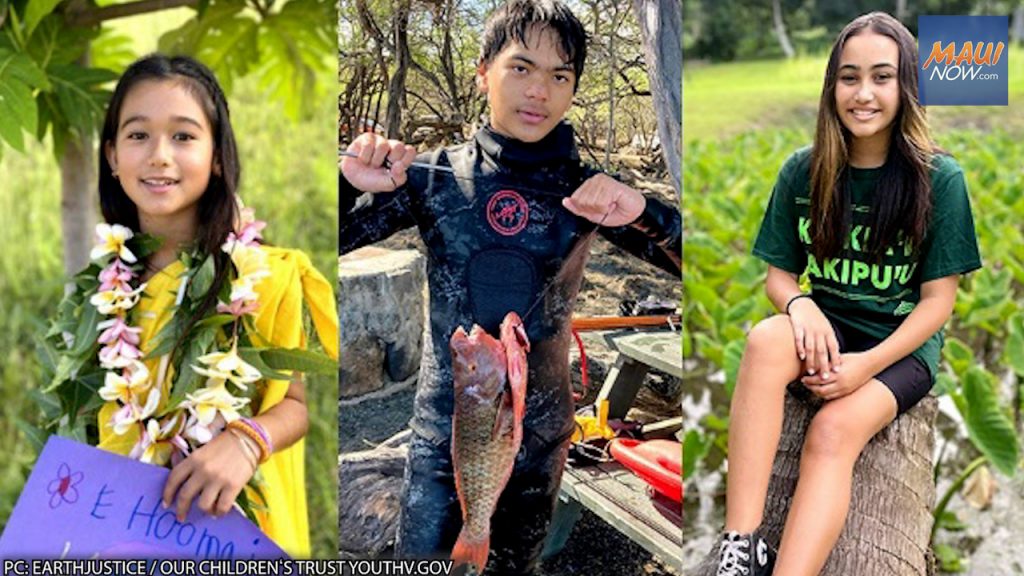14 Hawaiʻi youth, including 3 in Maui County, sue state over greenhouse gas emissions

Saying the state’s transportation system drives high greenhouse gas emissions that harms their communities, 14 youth, including three in Maui County, filed a lawsuit Wednesday against the state Department of Transportation, state officials and the State of Hawai’i.
The lawsuit, filed by Earthjustice attorneys in the state’s First Circuit Court, also alleges the state’s emissions violate the youngsters’ constitutional rights and undermines their ability to “live healthful lives in Hawai’i now and into the future.”
The state DOT via email today said it was advised to refrain from commenting on active litigation.
Youth are going to court to ensure HDOT follows through on the legal mandate, set by the state legislature, to decarbonize Hawai‘i’s economy and achieve a zero emissions economy by 2045, according to a news release on the lawsuit Navahine F. v. Hawai‘i Department of Transportation.
The youth plaintiffs range in age from 9 to 18 and from the islands of Hawai‘i, O‘ahu, Moloka‘i, Maui and Kaua‘i.
Maui County plaintiffs include Kawahine‘ilikea N., 12, of Moloka’i, Kaliko T., 11, of Honokōhau, Maui, and Brianna K., 14, of West Maui.
Youth plaintiffs in the suit detailed the negative impacts of greenhouse gas emissions on their lives.
Brianna K., also known as Kū, and her family are kuleana land holders in Kaulu Valley and depend on water from Kanahā Stream.
Due to climate change, the water level in the stream is inconsistent, and low flow interferes with their ability to use water for daily activities, including cooking, cleaning and working in kalo lo‘i.
In 2018, the ‘ohana lost their greenhouse, their crops, and large fruit-bearing trees to Hurricane Lane. The hurricane also triggered wildfires that destroyed homes and other structures in Kū’s community. Heavy rains regularly cause flooding, which blocks the road to the farm, and washes out crops.
Compared to people born in 1960, children born in 2020 are expected to face a two- to seven-fold increase in extreme climate events such as heat waves, wildfires, crop failures, droughts and floods, according to “Science” journal cited in a news release.
Hawai‘i’s per capita greenhouse gas emissions remain higher than 85% of the countries on Earth. Emissions from Hawaiʻi’s transportation sector are increasing and expected to comprise nearly 60% of Hawai‘i’s total greenhouse gas emissions by 2030.
Plaintiffs are asking the court to issue a declaration that HDOT is violating this right and the state’s public trust doctrine to “conserve and protect Hawai‘i’s natural beauty and all natural resources.”
“The Hawai‘i Department of Transportation has been a flat tire in our transition to a decarbonized future for too long,” Leinā‘ala Ley, attorney in Earthjustice’s Mid-Pacific Office and co-counsel for the youth plaintiffs, said in the release. “With this lawsuit, these young people are helping steer the agency towards genuine climate justice in the Hawaiian Islands.”
Counsel for the youth plaintiffs include Isaac Moriwake and Ley of Earthjustice and Andrea Rodgers and Kimberly Willis of Our Children’s Trust.
Navahine F. v. Hawai‘i Department of Transportation is one of several youth-led constitutional climate lawsuits brought by the nonprofit law firm Our Children’s Trust and fellow public interest firms like Earthjustice.
Our Children’s Trust also represents 16 youth plaintiffs who will proceed to trial in February 2023 in Held v. State of Montana as well as the 21 youth plaintiffs in the landmark federal constitutional climate lawsuit, Juliana v. United States.












